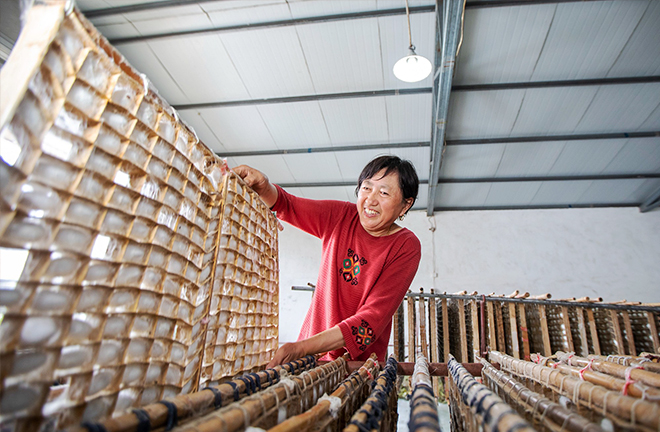Sociologists probe local experiences in China

A farmer is busy with managing silkworm chrysalides in Nantong, Jiangsu Province. Photo: CFP
General Secretary of the Communist Party of China Central Committee Xi Jinping proposed “advancing the rejuvenation of the Chinese nation on all fronts through a Chinese path to modernization” in the Report to the 20th National Congress of the CPC, elaborating upon the unique features and essential requirements of Chinese modernization. Xi’s proposal serves as a fundamental guideline for the indigenization of sociology in the new era.
Local experiences
There have been long-standing discussions on the connection between social theory and local experiences. Since the introduction of sociology into China in the late 19th century, various schools of sociologists have dedicated themselves to seeking a localized development path through theoretical and practical explorations.
At a recent seminar on “social theory and local experiences” co-hosted by the Department of Sociology at Peking University (PKU) and Academic Monthly, Zhou Feizhou, dean of the Department of Sociology at PKU, noted that since sociological studies were initiated by Yenching University a century ago, scholars have placed significant emphasis on empirical research, particularly on social investigations, embarking on a Chinese path integrating theory and experiences.
In the new era, researchers have increasingly introduced the historical dimension into sociology, producing fruitful research outcomes which utilize a historical lens to examine the history of Chinese society, past revolutions, and contemporary social phenomena, Zhou continued. Over time, they have established a China-centered stance, serving as a tool to understand Chinese society through a combination of Western theory, Chinese traditions, and fieldwork. To advance localization efforts, there is a growing demand for continuing sociologist Fei Xiaotong’s theory of China-centered cultural self-consciousness, which is the key factor driving disciplinary development.
Theory constitutes the foundation of disciplinary construction, while the first step needs clear conceptual clarification. According to Xie Zhongli, a professor from the Department of Sociology at PKU, the concept of “Chinese social theory” has different implications among scholars. He made a comparison between Member of the Chinese Academy of Social Sciences Jing Tiankui’s “Chinese sociological theory” and Zhou Feizhou’s “Chinese social theory.” Although the two theories are named “Chinese social/sociological theory,” they have significant differences. Jing’s theory is applicable not only to understanding “Chinese society” but other societies as well. It can be viewed as a general theory which describes and interprets all societies including China. In contrast, Zhou’s theory proposed in “Yiben and Yiti: The Basis of Chinese Sociological Theory” aims to offer a basic theory for Chinese society. It concentrates on and mainly serves to explain its own country.
In this context, Xie furthered the Merton model of structural functionalist analysis, dividing the middle-range theory into the field theory (confining to a certain field) and regional theory (confining to certain space-time). As the latter reflects nature and law differently than the middle-range and grand theory, it plays an irreplaceable role in sociological research.
Today’s so-called empirical research chiefly refers to American hypotheses and testing models, and falls into commonsense expansions, said Qu Jingdong, a professor from the Department of Sociology at PKU. However, sociological experiences imply indigenous and theoretical significance, while social theory means tracing the issue of origin.
The answer to Chinese civilizational sources and the integration of Western studies lies within the daily lives of ordinary people. Qu called for efforts to move beyond repetitive empirical verification and broaden research frontiers.
Ways forward
Reflecting on the development course of agricultural sociology, Xiong Chunwen, a professor from the College of Humanities and Development Studies at China Agricultural University, noted that American-born agricultural economics, which primarily focuses on farms and technological transmission, does not effectively serve to explain Chinese rural areas. Domestic mainstream disciplines on rural issues, agricultural economics and political economy, are also unable to solve the core issues of labor and land in rural society. Economics does not aim to investigate the underlying reasons for anti-market phenomena, such as the limited progress in the marketization of China’s agricultural land. However, this creates an opportunity for the field of agricultural sociology to explore this issue further.
Sociologists tend to examine social behaviors and human groups, while ignoring the ontology of people. As early as the 1940s, Chinese scholar Quentin Pan called upon sociologists not to be confined to the range of “society,” but to construct a discipline that encompasses human nature. Proceeding from Pan’s theory of weiyu [an educational concept developed from Confucianism], Zhou reflected on the problem of “seeing only society but not people” in partial sociological studies, seeking promising methodological paths.
Research on people must be holistic, Zhou added. It is not advisable to dismantle people into certain principles and their deviations from them. Research should also avoid reducing all aspects of human beings to their social and economic characteristics through cross-sectional analysis. Instead, sociological research should strive to capture the complexity and entirety of individuals as living beings.
With a history spanning over 5,000 years, Chinese culture has laid a deep-rooted foundation for the development of philosophy and social sciences with distinct Chinese characteristics. Ying Xing, a professor from Tsinghua University’s School of Social Sciences, pointed out that the historical dimension is often overlooked in the research patterns of mainstream sociology. This oversight results in a lack of robust empirical research, despite the crucial role that understanding historical China plays in interpreting its present-day society.
As such, Ying suggested adopting history as a separate and necessary dimension, shaping a four-dimensional research pattern which includes theory, methods, experiences, and history.
Edited by YANG LANLAN
